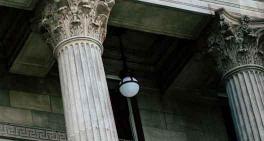Supreme Court to hear appeal of Missouri death row inmate
Legal Outlook
The Supreme Court agreed Monday to review the case of a Missouri death row inmate who says his rare medical condition could cause him to choke on his own blood during an execution.
The justices said they would hear the appeal of inmate Russell Bucklew. The court blocked Bucklew's execution in March after he argued that a tumor in his throat is likely to rupture and bleed during the administration of the drugs that would be used to kill him.
Bucklew argues that subjecting him to lethal injection would violate the Constitution's ban on cruel and unusual punishment.
The issue is whether Bucklew has to show there is another method of execution available that would reduce the risk of needless suffering.
Bucklew has proposed that the state use lethal gas instead of an injection of pentobarbital, if the execution is carried out. Missouri law still provides for the option of lethal gas, but the state no longer has a gas chamber and has not used the method since 1965.
Bucklew says it is likely he would essentially suffocate for two to three minutes if he is given a drug injection. The feeling of suffocation would last no more than 30 seconds using gas, he says.
But the federal appeals court in St. Louis ruled against him and concluded that he did not prove the alternate method would reduce his suffering. The Supreme Court has previously ruled that inmates challenging a method of execution have to show that there's an alternative that is likely to be less painful.
None of the 20 inmates executed since Missouri began using pentobarbital in 2013 have shown obvious signs of pain or suffering.
Related listings
-
NY high court nixes Trump's bid to delay defamation suit
Legal Outlook 06/16/2018New York's highest court on Thursday turned down President Donald Trump's latest bid to delay a defamation suit filed by a former "Apprentice" contestant who accused him of unwanted groping and kissing.The ruling by the state Court of Appeals didn't ...
-
Polish court rules against man who wouldn't serve LGBT group
Legal Outlook 06/12/2018Poland's Supreme Court has ruled against a businessman who refused to print posters for an LGBT business group because he did not want to "promote" the gay rights movement. The country's top court said it was upholding the ruling of a lower court. Th...
-
Court to consider fraud investigator in NFL concussion case
Legal Outlook 06/01/2018A federal judge in Philadelphia is scheduled to hear arguments in the NFL's request for a special investigator to look into what the league says are fraudulent claims in a $1 billion concussion settlement.The league last month cited an independent st...

Chicago Business Fraud Attorney
Business Fraud can take many forms. In the broadest terms, a fraud occurs when someone intentionally deceives others for personal gain. Many times business fraud is harmful and recovery is necessary. Losing your personal or business’s assets can devastate your entire life. Contact Roth Law Groupto receive help on restoring your business to normalcy before you were victimized with fraud. Business fraud cases can involve multiple people and complicated schemes aimed at deceiving the public, auditors, investigators, or others. Whether you are dealing with corporate fraud or commercial fraud, we can step in and fight back to receive compensation that you deserve.
At Roth Law Group we are devoted to prosecuting and defending the legal rights of individuals and small businesses, as either plaintiff or defendant. Proving fraud can be extremely difficult. To have a successful business fraud case, one must prove that the defendant purposefully set out to defraud the victim. Fraud cases are being investigated more aggressively than ever. With increasing federal regulation and scrutiny of corporate practises, many individuals and businesses find themselves the subject of business fraud investigations.




